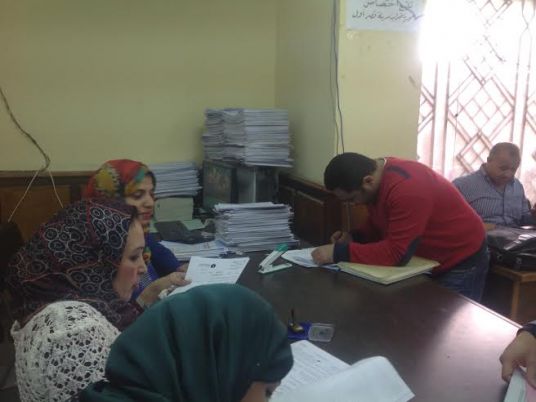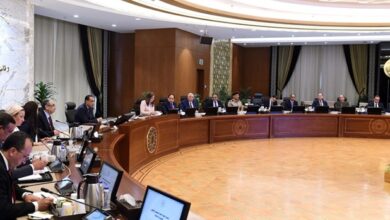A lawmaker representing the Muslim Brotherhood’s Freedom and Justice Party (FJP) said on Thursday that his party had not decided to push for sacking the military-appointed cabinet or forming a new government. He contended that “the situation cannot afford more turmoil.”
“We are ready to do that at the appropriate moment,” Sobhi Saleh, a member of the newly-elected People’s Assembly told Egypt Independent in a phone interview. “The situation is already unstable and we are pursuing stability.”
The Alexandria-based MP was reacting to a groundbreaking statement made last night by Khairat al-Shater, the Muslim Brotherhood’s assistant supreme guide. The 62-year-old engineer told the Qatar-based Al Jazeera satellite channel that his group is dissatisfied with the performance of the incumbent cabinet, headed by Kamal al-Ganzouri, and is willing to form a new coalition government.
“We do not agree that Ganzouri’s cabinet remains [in office],” said Shater, who is believed to be the Muslim Brotherhood’s most influential figure due to his extensive financial support for the group. “We should rush to form a large coalition cabinet to run Egypt’s affairs at this juncture and not to wait until the president of the republic is elected.”
Shater added that such a new cabinet must be headed by the FJP, which holds the largest number of seats in Parliament, and include different parties represented in the People’s Assembly and potentially groups that did not make it into Parliament.
If the Supreme Council of the Armed Forces does not heed such demands, Parliament can mobilize a no-confidence vote or protests could be resumed, according to Shater. “All options are conceivable,” he added.
His statement took many observers by surprise as it marked a departure from the group’s lenient position on the military-backed government. The recent killings of at least 74 people at a football match in Port Said intensified calls on Parliament to hold a vote of no-confidence against Ganzouri’s cabinet and form a national salvation government.
The FJP-dominated lower house has been so far content with putting the blame on Ganzouri’s interior minister. For many analysts, the Brothers believe that demanding the expulsion of the incumbent premier might lead to a head-on confrontation with the SCAF — a scenario that the nation’s oldest Islamist organization and its political wing seem determined to avoid.
“Khairat is speaking about willingness and not a decision. He said we can do that but he did not say we have already decided to do that,” Saleh added.
For Saleh, like many FJP leaders, there is no point in forming a new cabinet in the midst of the ongoing Shura Council elections and only few months before the transitional period is set to conclude. He holds that after the new president takes office, a new cabinet will be formed automatically.
According to the latest SCAF-set timeline, a new president shall be elected during the first week of June and the generals shall return to the barracks by the end of the same month.
According to Hassan Abou-Taleb, a political analyst with Al-Ahram Center for Political and Strategic Studies, Shater’s statement is more of a political maneuver.
“This is not serious at all,” Abu-Taleb said. “They know that the constitutional declaration gives the [SCAF] rather than Parliament the responsibility of the cabinet.”
The 63-article temporary constitution does not state that Parliament can sack or appoint a cabinet.
Abu-Taleb ruled out that the group is genuinely interested in forming a cabinet before the transitional period is over.
“This will put a huge burden on it [the party],” added Abu-Taleb, explaining that if they form a cabinet, they will be incur all the criticism currently directed at Ganzouri.
With this statement, Shater is “flirting” with revolutionary forces that waged a verbal war against his group for not taking a firm stance against the incumbent cabinet in the aftermath of the Port Said violence, said Abu-Taleb.
“In the meantime, he is sending a message to the SCAF that they [the Muslim Brotherhood] can screw up the whole political scene,” he added, explaining that the group might be seeking to enhance its bargaining power before writing the new constitution.
Shater hopes that the SCAF will allow the Brotherhood a stronger influence over the constituent assembly that will draft the constitution, argued Abu-Taleb.
The new Parliament is set to elect the 100-member assembly after Shura Council elections conclude later this month. Although the transitional constitution does not give the generals the right to interfere in the formation of that assembly, the SCAF has made constant attempts to impose a set of eligibility conditions for potential architects of the constitution. For the last few months, there have been indications that the Brotherhood and the SCAF may clash over this matter.
Khalil al-Anani, an expert on the group and a political scientist at Durham University, ruled out that the Brotherhood is really seeking to form a cabinet immediately, arguing that Shater's statement falls within the context of signals exchanged between the generals and Islamists for larger arrangements.
“Shater is signaling to the SCAF that the Brotherhood will not give up the premiership. It is part of the ongoing game between SCAF and the Muslim Brotherhood,” Anani said.
“The Brotherhood is eager to take power in the government; however, this will come as part of a compromise with the SCAF on the presidential candidate the SCAF will back. The SCAF will get the presidency and the Brotherhood takes [the premiership],” he added.
The Muslim Brotherhood affirmed on several occasions that it will not field a presidential candidate, but it has not yet announced who it will endorse among those expected to run. Most experts hold that the Brothers will eventually back the SCAF-sanctioned presidential hopeful, but it remains unclear who the military elite can entrust with the presidency.




